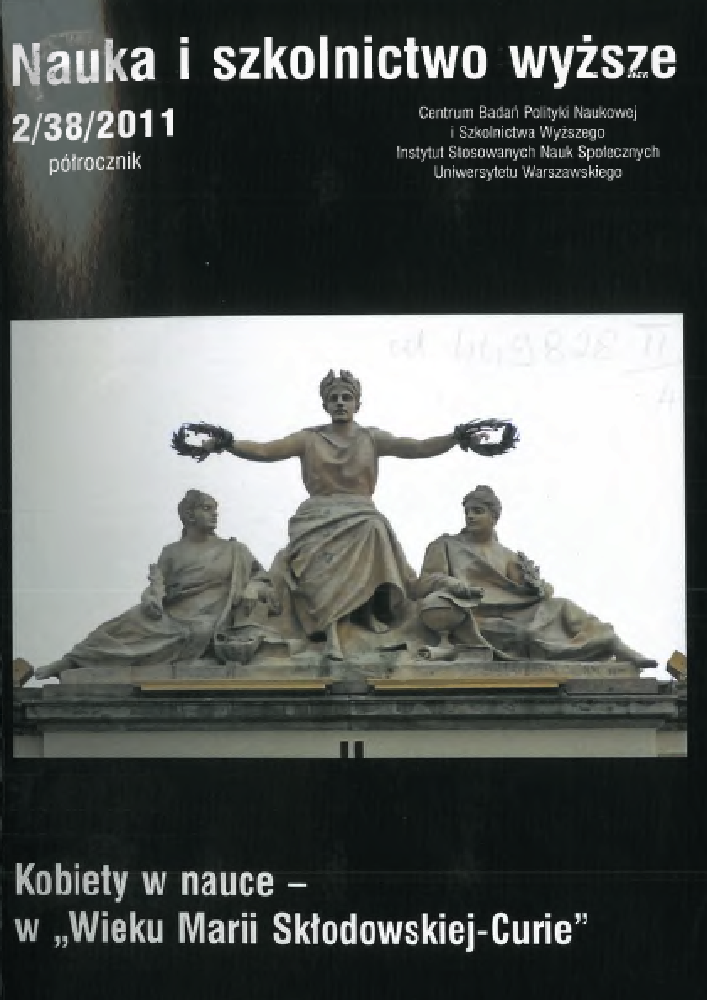Abstract
Cezaria Baudouin de Courtenay-Jędrzejewiczowa (1885-1967) belonged to the narrow circle of women researchers active in the interwar period. Her success was was attained not only through her inborn skills, perseverance and talent for organization, but also through many favorable coincidences. Daughter of the prominent linguist Jan Baudouin de Courtenay, she left her home with a substantial intellectual Capital, but also with her family’s support for her scientific ambitions. Thanks to this support - and the unique circumstances of the improved political situation in Russia after 1905 - she managed to complete her studies at the University of Saint Petersburg. Her interest remained highly influenced by the personality of her father and focused around the issue of linguistics - although beyond the phenomena of language she quickly started to recognize the cultural ones, directing her attention to the anthropology issues. She started her professional activity as a teacher of Latin in female secondary schools in Warsaw, however her moving to Vilnius opened possibilities for her working as an academic lecturer - what could be achieved by habilitation at the University of Warsaw in 1922. In the following years, first as Deputy Professor, and from 1929 as Assistant Professor of Ethnology and Ethnography at the University of Stefan Batory in Vilnius, she organized an ethnographic center in Vilnius, established numerous relationships with local associations supporting the folk industry, created a Museum of Ethnography and began systematic field studies of the local folklor. In 1934 she moved to Warsaw, where she received a nomination for Professor of Polish ethnography at the University of Warsaw. Warsaw also owes her the organization and the revitalization of the ethnography department, the extracting from the collections of the State Museum of Ethnography, the education of a group of dedicated and talented students. After the outbreak of the second world war, Cezaria Baudouin de Courtenay flew through Romania to the Middle East, where she conducted research and participated actively in the creation of Polish scientific institutions: the Iranistic Studies Society in Tehran, the Office of Middle and the Middle East Studies, the Polish Humanist Institute of Science in Jerusalem. After the war, she settled in England, where she acted, among others, in the Polish Scientific Organization Abroad and the Polish Abroad University, where as from 1958 she was the Rector. Her private life raised many comments: married three times at a time when divorce was barely acceptable socially, every time she chose distinguished men: her first husband was Maximilian Vasmer, a classmate from her studies in St Petersburg, and in the futurę, Professor in Berlin and the star of world Slavonics, the second - Stefan Ehrenkreutz, activist of the Polish Socialist Party, and afterward Professor of the Old Lithuanian Law at the University of Stefan Batory in Vilnius and the last Rector of this University, the third - Janusz Jędrzejewicz, activist of the Polish Socialist Party and The Polish Army Organization, a co-worker of Józef Piłsudski, the Minister of Religions and Public Education and Prime Minister. The unfriendly ones claimed that the position of the last spouse did not remain without influence on the scientific career of Cezaria Baudouin de Courtenay. In such situations, we normally appeal to the judgment of passing time: in the case of our heroine it is probably favorable for her: her work are still reissued, and her ideas and concepts are still alive and appreciated. The website of the Institute of Ethnology and Cultural Anthropology of The Warsaw University welcomes us with her photograph as the “mother founder".
References
Baudouin de Courtenay-Ehrenkreutz C. 1918 Echa stosunków polsko-rosyjskich w Bylinach, Warszawa.
Baudouin de Courtenay-Ehrenkreutz C. 1922 Św. Cecylia, przyczynek do genezy apokryfów, „Lud”, z. 2.
Baudouin de Courtenay-Ehrenkreutz C. 1929 Ze studiów nad obrzędami weselnymi ludu polskiego, Nakładem Towarzystwa Przyjaciół Nauk w Wilnie, Wilno.
Baudouin de Courtenay-Ehrenkreutz C. 1934 Zakład Etnologii Uniwersytetu Stefana Batorego w Wilnie i jego zadania, Wilno.
Baudouin de Courtenay-Ehrenkreutz-Jędrzejewiczowa C. 1944 Wskazówki dla zbierających przedmioty dla muzeów i archiwów etnograficznych w Polsce, Związek Harcerstwa Polskiego na Wschodzie, Jerozolima.
Baudouin de Courtenay-Ehrenkreutz-Jędrzejewiczowa C. 2005 Łańcuch tradycji. Teksty wybrane, Wydawnictwa Uniwersytetu Warszawskiego, Warszawa.
Bazylow L. 1984 Polacy w Petersburgu, Zakład Narodowy im. Ossolińskich, Wrocław - Warszawa - Kraków.
Bystroń J.S. 1929 Opinia o dorobku Cezarii Ehrenkreutz, Archiwum Akt Nowych w Warszawie, Ministerstwo Wyznań Religijnych i Oświecenia Publicznego, j. 3142 (akta personalne C. Baudouin de Courtenay-Ehrenkreutz-Jędrzejewiczowej).
Czajecka B. 1990 Z domu w szeroki świat...". Droga kobiet do niezależności w zaborze austriackim w latach "1890-1914, Towarzystwo Autorów i Wydawców Prac Naukowych Universitas, Kraków.
Małachowska E. 1973 Jan Baudouin de Courtenay w życiu prywatnym: wspomnienia o moim ojcu, „Przegląd Humanistyczny”, nr 3, s. 91-104.
Muzalewska-Aleksandrowicz H. 2007 Korespondencja Cezarii Baudouin de Courtenay-Ehrenkreutz-Jędrzejewiczowej z Marią Znamierowską-Prufferową. Przyczynek do historii etnologii polskiej, „Rocznik Muzeum Etnograficznego w Toruniu”, Toruń, t. 3, s. 119-142.
Stowarzyszenie... 1936 Stowarzyszenie Kobiet z Wyższym Wykształceniem w latach 1926-1936, Warszawa.
Zachara J. 1937 Historia pierwszego na ziemiach Polski Gimnazjum Żeńskiego im. E. Plater w Krakowie (przemówienie na uroczystości czterdziestolecia), Drukarnia Polska F. Zemanka, Kraków.
Zamojska D. 2009 Akademicy i urzędnicy. Kształtowanie ustroju państwowych szkół wyższych w Polsce 1915-1920, Wydawnictwo Instytutu Historii Nauki PAN, Warszawa.
